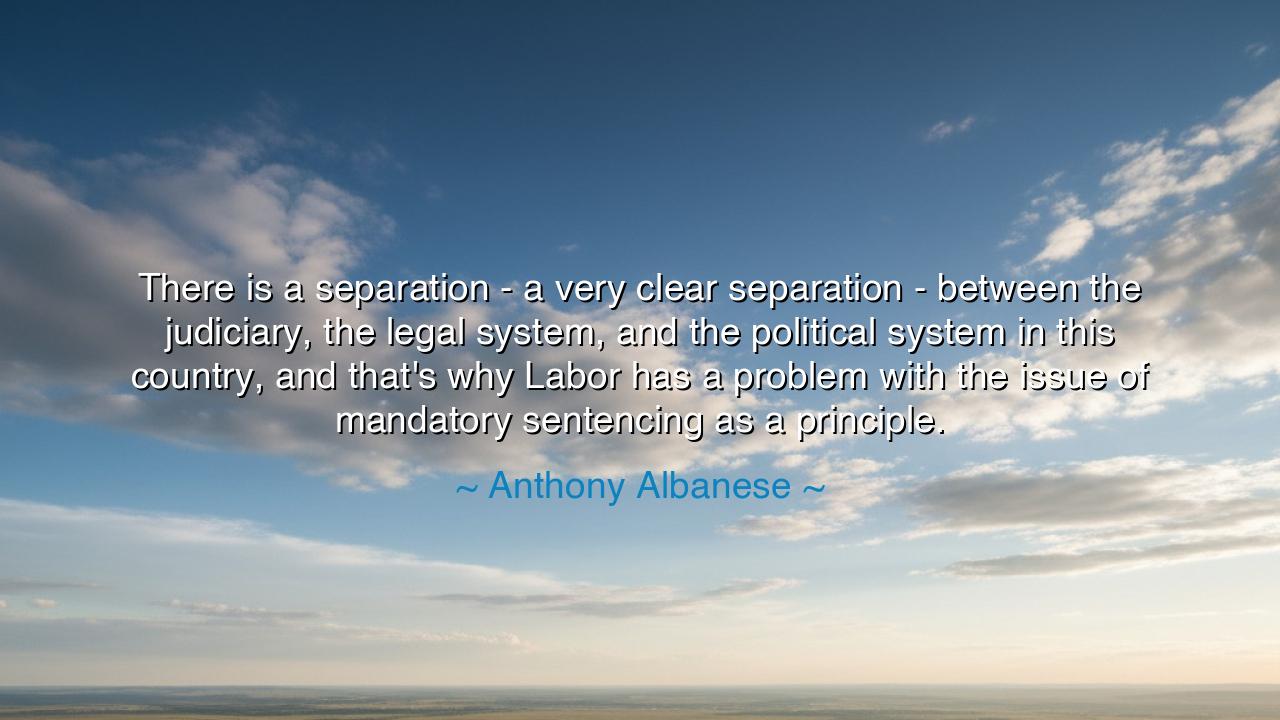
There is a separation - a very clear separation - between the
There is a separation - a very clear separation - between the judiciary, the legal system, and the political system in this country, and that's why Labor has a problem with the issue of mandatory sentencing as a principle.






Hear now, O seeker of wisdom, the words of Anthony Albanese, who proclaimed with clarity: “There is a separation – a very clear separation – between the judiciary, the legal system, and the political system in this country, and that's why Labor has a problem with the issue of mandatory sentencing as a principle.” These words are not of passing concern, but of deep foundation, for they speak to the architecture of freedom itself, the sacred balance of power that preserves justice from the grasp of tyranny.
The ancients understood this truth well. From the time of Aristotle, it was taught that the polis must divide power lest it fall into corruption. Centuries later, Montesquieu gave voice to this wisdom again, declaring that liberty depends on the separation of powers: that the maker of laws must not also be the judge, nor the judge the executioner. For if all power rests in one hand, justice perishes, and the people are enslaved. Thus Albanese, echoing this ancient teaching, warns that mandatory sentencing, imposed by politicians, is a breach of that sacred separation.
To understand the weight of his words, consider what mandatory sentencing means. It strips the judiciary of discretion, chaining the hands of judges so that they cannot weigh mercy against law, circumstance against offense. It allows the political system to dictate punishment, bending justice to the winds of ideology or populist cries. What appears at first as firmness in law may, in truth, be cruelty disguised as order, for it denies the human element of judgment that the ancients called phronesis—practical wisdom.
History offers grim lessons. Recall the Draconian laws of ancient Athens, so harsh that even minor offenses were punished by death. The people rose against them, for justice without mercy became tyranny, and so they called upon Solon to reform the laws, balancing firmness with humanity. Or think on the mandatory sentencing policies of modern times, such as the “three-strikes” rule in the United States, which filled prisons with men and women serving life sentences for minor crimes, swelling injustice in the name of order. These examples reveal the peril of collapsing the boundaries between lawmakers and judges.
Yet Albanese’s words are not only caution, but instruction. He calls us to guard the independence of the judiciary, for in that independence lies the people’s shield against the excess of rulers. To maintain the separation between politics and justice is to ensure that the scales of law remain balanced, unmoved by the passions of the day or the ambitions of the powerful. The health of a democracy is measured not only by its elections, but by the integrity of its courts.
The lesson is thus: justice must remain free from the chains of political manipulation. A society that prizes freedom must resist the temptation of quick answers—of mandatory sentencing that promises security but delivers injustice. True justice requires patience, discretion, and the wisdom of judges unbound by partisan decree. Only then can the people trust that each case is weighed fairly, that punishment is tailored to both deed and circumstance.
Therefore, O listener, guard well the boundaries between the realms of power. Speak against laws that erode judicial independence. Demand that leaders honor the principles of accountability, but not at the cost of fairness. In your own dealings, remember the spirit of this teaching: do not judge by rigid rule alone, but weigh each matter with discernment and mercy. For as the ancients knew, a law without wisdom is but a weapon, but a law tempered by judgment becomes a path to justice.
So let Albanese’s words endure as counsel to generations: that the separation of powers is no mere detail of governance, but the cornerstone of liberty itself. To ignore it is to invite tyranny; to uphold it is to preserve freedom. Let us then live as guardians of this sacred balance, ensuring that justice remains unshaken, unbent, and unbroken before the storms of politics.






AAdministratorAdministrator
Welcome, honored guests. Please leave a comment, we will respond soon